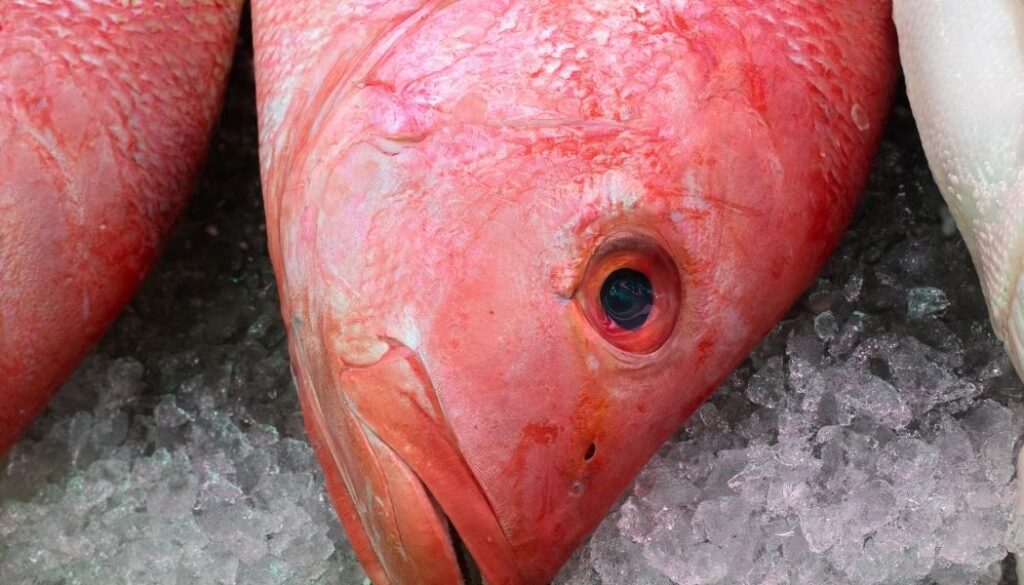
“Fresh fish! Get your fresh fish here!” the man yelled as he walked alongside his horse-drawn wagon, making his way slowly down 112th street between St. Nicholas and Seventh Avenues in New York City at eight 0’ clock that sun-lit summer Saturday when I was nine.
I stuck my head out my mother’s bedroom window to get a look. “Why doesn’t he have a truck?” I wondered.
“Do you want a fish for dinner tonight?” Mama asked as she stood behind me at the window.
“Yes!”
“Get us a red snapper,” she said, handing me the money.
I ran down the four flights to catch the fish seller before he left our block.
Mullets, porgies, and other fish I couldn’t name covered the ice- packed wagon.
A red snapper placed on his side, whose one sad, clear eye looked up at me, was our red snapper. He was about a foot and a half long, with skin that was firm when I touched it. I pointed at him. I must have paid the man, but the next thing I remember is having our red snapper, wrapped in newspaper, in my arms.
After carefully walking upstairs, I found my mother waiting by the door.
She took our red snapper, examined him, and smiled.
Every Saturday I went to the butcher’s, the grocery store, and the fish market with Mama. Three years later, after my twelfth birthday, we would make the list together, she would hand me a hundred dollar bill, and promote me to solo grocery shopper.
But this morning was the first time I made a purchase on my own.
“We can’t eat this whole fish by ourselves,” Mama said as I followed her fast-moving slim–elegance, wrapped in a maroon robe, down the long hall to the kitchen. “Call Ba’Ruth and Kelly. Better call Gene, too. Tell him to bring some ice cream. And Ba’Ruth and Kelly can pick up some ginger ale when they get to the city.”
Ba’ Ruth and Kelly lived in Cambria Heights, Queens, but they would have enough time to drive in for dinner. Ba’Ruth had lived with us until last year when she married Kelly. Although she wasn’t the “baby” anymore–Mama’s youngest sister was born seven years after Ba’Ruth—the name stuck.
When I returned to the kitchen, Mama had already scaled and gutted the fish. She left the head on for me because Mama knew I liked to ferret out the fish in the bony head and eat the eyes.
Our red snapper just barely fit the roasting pan. Mama’s long-fingered hands moved with the grace of a ballerina and the authority of the professional cook that she was as she gathered the seasonings.
The silver pan had a slotted removable section which would collect the fish juices and the bay leaves, lemons, onions, and salt. Mama would spoon this rich broth over the fish.
I washed the new potatoes leaving them unskinned. With the carrot peeler, I peeled a belt of skin off their waists. Mama had taught me to do this so the skins wouldn’t crack once the potatoes were cooked. I must have made a salad and put the string beans on to boil.
While flinging the white tablecloth over the black wooden dining room table, I heard the sibilant hiss of the fish cooking and smelled the mingling of bay leaves and onions.
Just as I finished putting the spoon down next to the midnight blue goblet for the last table setting, the doorbell rang. Mama went to answer it.
Ba’ Ruth and Kelly came in while I was in my bedroom putting on my company clothes. I probably wore the outfit my Philadelphia aunt had given me that summer. The navy blue shorts picked up the navy blue in the plaid border on the cuffs of my white short-sleeved blouse.
By the time I walked into the dining room, Gene had arrived, too. Everyone was taking their seats around the table.
“What you been up to, Lucy?” Ba’ Ruth called me that because she said I acted like Lucille Ball in I Love Lucy.
You could tell Ba’ Ruth and Mama were sisters because they had the same lash-heavy Ebaugh eyes that all our family had, but Ba’ Ruth was fuller figured. She wore a white dress with black polka dots that fit her hips closely.
“How’s my favorite niece?” asked Kelly. Although the bullet head that disappeared into his neck and his muscled arms made him look like a football player, he was one of the guards who worked in the Holland Tunnel. I was Kelly’s only niece, so I laughed at his silly joke.
“Wendy, please bring out the salad and the string beans, the fish is already on the table.”
Our red snapper, centered on the table, placed on the large white platter with the faded blue willow pattern, encircled by the new potatoes and crowned with a lemon slice, looked like a king surrounded by his courtiers.
The aroma of bay leaves, onion, and fish broth danced around the table.
Gene said a short grace as the light played with the silver in his close-cropped hair. Mama began serving the pre-sliced fish to each of us while we passed the salad and string beans to each other family style.
On her left, at one end of the table, she served Gene. He was the neighborhood number runner and family friend who lived across the street. Gene called up to me from the street every school morning, “Susu, the bus is here!” rousing me from my quick nap on the living room couch.
I didn’t need another nickname, but it was said with such affection I didn’t mind.
Why was Gene putting me on the school bus in the morning instead of my mother? Mama started work at 7 AM, so she couldn’t be there at 8 AM when the bus came.
At that time, she was the sandwich and salad maker at the employees’ cafeteria at Standard Brands, the company that made Planter’s Peanuts. A few years later, she would become the manager of the cafeteria and possibly the first Black woman in management at a Fortune 500 company.
When I was twelve, in answer to the question grown-ups always asked children, I told Gene I wanted to be a writer.
Within a week, he had brought me a used, but still serviceable, gray Remington typewriter with dark green keys. It was in a brown carrying case but was not in a box from a store. Much later, I wondered where it came from. But at the time, I was just eager to start using it.
During my senior year as Scholar of the House, Yale’s version of independent study, I wrote a novella entitled Shorty–the title character was based on Gene–using that same typewriter.
Mama served Ba’ Ruth seated next to her on her right. She did act like the entitled baby of this family of seven sisters and two brothers.
When Ba’Ruth was asked–at the hospital where she worked as a nurse’s aide–to submit the paperwork to change her last name after her marriage, she refused. All her coworkers had attended her wedding, Ba’ Ruth said, so they knew she was married. After much back and forth, the administration saw Ba’ Ruth wasn’t going to comply, so they let her be. This was before the era of liberated married women choosing to keep their birth names.
She was one of my favorite aunts. Every year she took me to the Barnum & Bailey Circus as soon as it came to town. And at Christmastime–since I didn’t have an allowance–she shared her Christmas Club money with me, so I could buy a gift for Mama.
Kelly reached his plate across from his end of the table for his portion. In the coming years, Kelly would give me my first bicycle and teach me how to play chess. We went to see A Patch of Blue. Kelly was one of the many surrogate fathers who took the place of the man who left both me and his marriage to my mother when I was six months old.
Finally, Mama served me and then herself. The swirly black skirt she wore draped the chair she sat in.
As I lifted a piece onto my fork, the moist skin released its juiciness. First, I blew on it to cool it down, and then I tasted it. Our red snapper tasted like sunlight, laughter, and love.
About Wendy Jones
Wendy Jones is a Harlem-born New Yorker. Her fiction and non-fiction is grounded both in her personal history and in African American History.
Although Ms. Jones earned an M.F. A. in Fiction from Columbia University, her first writing teachers were her mother and grandmother. By listening to these storytellers, she learned how to write dialogue and the importance of specific details.
Her first and only play, In Pursuit of Justice: A One-Woman Play about Ida B. Wells, starring Janice Jenkins, won four AUDELCO Awards.
The debut publication of Ida Bell Publishing, LLC, was a biography of perhaps the first Black woman in management in a Fortune 500 company and a Harlem activist, An Extraordinary Life: Josephine E. Jones. The book is available on the publisher’s website and at numerous libraries, including the New York Public Library’s Schomburg Center for Research in Black Culture.
As president of the publishing company, Wendy Jones publishes literary fiction, serious non-fiction, and children’s books by people of color, new immigrants, all women, and other outsiders.
Please visit the website to preorder the forthcoming publication, The Culinary Art Portfolio of Josephine E. Jones, where art and food intersect.


